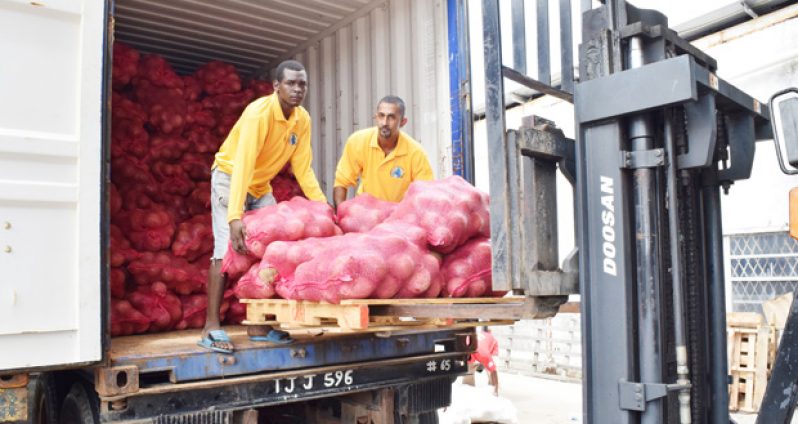– but exporter wants improved industry standards
By Shauna Jemmott
AS the demand for Guyana’s coconuts increase on the North American market, a leading coconut exporter is calling on coconut farmers to re-cultivate their lands and at the same time pay attention to standards, quality and honesty.

Shook Shivmangal, President of Compass International Trading Company (CITC), said while his company is doing as much as it can to uphold export laws and improve the quality of coconuts Guyana supplies the market, he is seeking only “honesty” from farmers who supply his company with the dry coconuts.
“Whatever food product we’re processing, we must [be] able to comply with the Food and Drug regulations and the Guyana Government regulations,” he told the Sunday Chronicle in an interview at his office located at Le Ressouvenir, East Coast Demerara.
“We want [to] run a very professional business and we would like for farmers to call us and we could mobilise them.”
According to the National Agricultural Research and Extension Institute (NAREI), Guyana produces around 242 million nuts per year from trees planted on some 70, 000 acres of land. Average production per acre is 4,000 nuts, but NAREI says there is potential to harness at least 0.10 million acres to reach a production target of a minimum of 500 million nuts.
Shivmangal’s company boasts full compliance with standards and procedures governing export in Guyana and internationally, Shivmangal told the Sunday Chronicle.
His company has over the eight years of its existence, cashed in on the “old crop”’ from coconut trees planted decades ago. Those old coconuts, which produce more fats, have become high in demand on the foreign market.
He complained that while his company is creating avenues for coconut farmers to benefit from their product, some exporters are supplying the very markets with bad nuts, creating a stain on Guyana’s coconut export industry.
And also with competition high on the market, the price has decreased over the years.
With higher demands from overseas buyers, he is seeking assistance from government to extend his business in ways in which Guyana would be able to meet a challenge, whereby he was given five to six years to show massive improvement in quantity of supplies.
Additional products this year include the production of virgin coconut oils, frozen coconuts, and coconut water.
He said his company is also preparing to venture into the export of frozen papaya and passion fruit, since major overseas buyers have expressed an interest. He is therefore encouraging farmers to plant more of the fruits so that they too can benefit.
“My goal is to help the agriculture sector, because I came from a farming background. We want to encourage farmers.
“Guyana is a poor country [and] farmers may go for a dollar more from foreign exporters, but think about the long-run and export good quality, so that more products will be demanded from Guyana.”
As a boy, Shivmangal worked on his family’s rice farm in Berbice and worked as a cane-cutter before he migrated to the United States in 1984. After several visits home, he observed coconut being wasted, even in his home-county, Berbice.
“We call something Pompey nuts. When the coconut begins to grow, “pompey nut” is the nut that buss eye and grow [and] when you cut it there is something inside and what the inside is, you could eat it – something we call “pompey” [some call it kaja].
“I saw that was throwing away all over the place, because the coconut is not being used. I thought that there was a dire need for a market for this coconut…so I went out to different companies [in North America] to acquire markets.”
He said he began buying coconuts from The Pomeroon in Region Two and while the quality of the nuts could not meet demanded standards, his company, with the help of its overseas partners, assisted the farmers in supplying what was needed to improve the quality of coconuts.
Compass International is also thankful to parent company Caribbean International Trading Company, for assisting them in becoming one of the major coconut export companies in Guyana.



.jpg)










